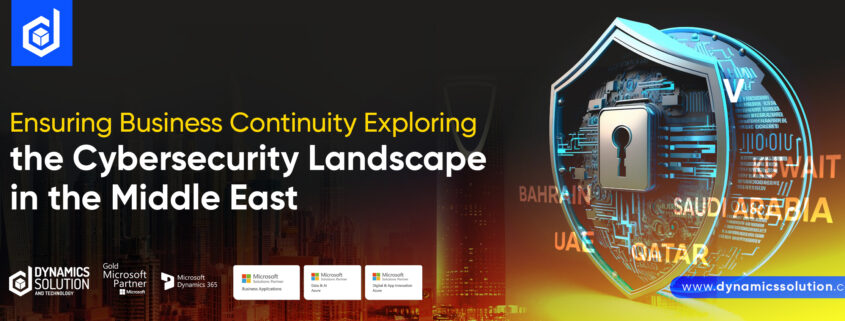Middle East has been exceeding beyond limits in technological innovation, with major plans like NEOM City and Saudi Vision 2030 paving the forward. However, with technological advancements there is always the looming threat of cyber-attacks. Saudi Arabia and the UAE faced an increase in the number of cyber-attacks in between 2021 and 2022, according to a report by Group IB.
Majority of these attacks were ransomware attacks which would make organizations extremely vulnerable. As per Middle East Institute, on an average, there were nine hundred and twenty five cyber-attacks reported per week in 2021, while in the UAE the average was four hundred and eight attacks.
These advancements and major cyberthreat events have caused a seismic shift in the Middle Eastern cybersecurity landscape and has catapulted the cybersecurity measures adopted by organization all around the region. Digital transformation of organizations plays an important role in the widespread need felt for cybersecurity. According to Polaris, the Middle Eastern cybersecurity market was valued at $14 billion in 2023.
This blog explores the trends that are shaping the cybersecurity landscape in the Middle East and Microsoft’s security applications which are currently leading the way.
The Pandemic and Cybersecurity
The rise of cyberthreats and expansion of attack surfaces is not only related to the growing technological advancements. The pandemic has been a major trigger for the rising attacks as well. With the world becoming hyper-digitalized to combat physical isolation, vulnerabilities were amplified and became a focal point for attackers. Due to the digital economy and remote work being novel concepts, there was prevalent lack of cybersecurity awareness among employees and executives.
The rapid roll out of digitalized systems without any knowledge of proper security infrastructure meant a huge attack surface. Threat actors were able to infiltrate digital infrastructures of organizations and monetize in on the security vulnerabilities at a rapid pace. Malicious code and ransomware impacted the public and private organizations, threatening business continuity and valuable data.
Cybersecurity Initiatives in the Middle East
UAE and Saudi Arab have been forced to take the matter of building cyber resilience seriously and have dedicated teams of professionals to curate regulations and policies to combat the ever-growing threat landscape.
Notable Initiatives in UAE:
UAE has a cybersecurity council for planning and propagating cyber security policies for securing public, private and government digital systems. It has also formed National Electronic Security (NESA) and the Dubai Electronic Security Center (DESC). In 2020, the UAE government allocated $381 million for its budget for cybersecurity.
The Dubai Cyber Security Strategy 2023 created by DESC focuses on creating a trusted and secure cyberspace and has the two core guiding principles that every data security strategy should propagate:
- Free flow of information and openness
- Compliance with laws and regulations.
Notable Initiatives in Saudi Arabia:
The Saudi Arabia’s National Data Management Office issued National Data Governance Interim Regulations in 2020, a part of which dictates that personal data protection should be applied to all entities which process data in the country. Moreover, the National Cyber Security Authority works closely with both the public and private organizations to protect data infrastructures, national security systems and services in association with the Saudi Vision 2030.
The Saudi Government allocated $666 million to enhance the country’s cybersecurity infrastructure. Lastly, the Saudi Arabian Monetary Authority and Saudi Federation for Cybersecurity, Programming and Drones have been working to aid in bettering the cyber resilience plans and policies.
Cybersecurity Trends in the Middle East
As per current information, a large number of companies are facing the issue to decide either to pay the ransom or attempt to recover and restore the program that runs their data after a ransomware attack. In short, the pressure to get a full-fledged back up and running is nerve-wracking.
As the firms often don’t know that the cyber Treat Actors (TA) has installed further interference measures, such as backdoors or copied passwords, paying the ransom poses a significant risk. Businesses like yours may risk further assaults if they do not adequately clean up their networks of any harmful materials that may have been there.
Did You Know?
As per Cybereason finding, 84% of UAE corporations paid the ransom in these assaults, which is almost more than 20% than the world average. Ninety percent of the paying businesses had a second ransomware assault, and 59 pc discovered data corruption.
Although these ransomware groups and tendencies are not unique to the UAE, the country serves as a good example of how the rest of the Middle East, with its rapidly developing economies, should start to address the security risks associated with modern technology.
Therefore, it’s essential to stay updated with the threat environment. Businesses should be prepared for TAs to continue using new tactics. In addition, ransomware is not likely to be the last chapter in these dynamic, and new threats and difficulties will emerge as a result of innovation.
In the years to come, cyber defenses will undergo significant improvements, but cyber criminals will be quick to follow suit, using emerging technologies to evade detection.
Protect Your Business Now
You need solutions that address the identity, compliance, and security demands of your people, data, and infrastructure in order to protect your organization from ever-changing hazards.
Microsoft security solution are the backbone of safe contemporary corporate settings, providing complete protection for all your devices, identities, apps, and clouds.
Almost every product or application that has any digital presence or exists in the current ecosystem needs security, and if you are an existing user of Microsoft online services, you need to rely on Azure Active Directory.
Azure Active Directory (AD) is a corporate identity solution that helps safeguard your users against 99.9 percent of cyberattacks with features like:
- Conditional access
- Multi-factor authentication (MFA)
- Single sign-on.
It also:
- Get your employees connected to all of your apps, no matter where they are or what device they’re using.
- Assist in securing data and app access while keeping things easy for consumers.
- Make your business more secure, use the correct access restrictions.
Dynamics Solution and Technology, a Microsoft Gold Partner, company makes it easier to safeguard your important technological assets. Not only can our consultation-driven architecture assist in preventing attacks, but it can also identify security breaches and put them under control quickly.
We implement the most effective and protected solution for our clients by utilizing the expertise of a specialized strategic consulting team with cybersecurity professionals. So, if you also want to be on the top protected business list, reach out to us here!







